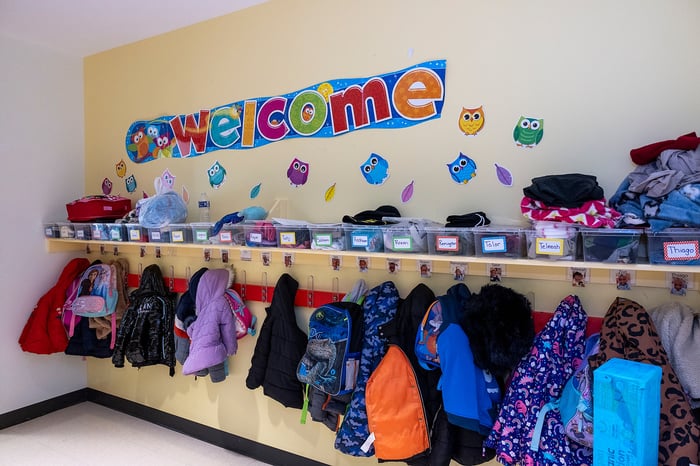Leaders Can't Wait: Our Roadmap for Supporting Students When Federal Policies Fail
school improvement • 4 min read • Jun 30, 2025 9:22:17 AM • Written by: Sarah Sandelius

The headlines are alarming, but they're not just headlines for us—they're our daily reality. As federal policies threaten special education funding and the 7.5 million students served under IDEA face an uncertain future, we're hearing from school leaders across the country who are already making impossible choices. Cut services? Reduce staff? Hope for the best?
At The Ability Challenge, we believe leaders can't wait for federal policies to stabilize. That's why we're launching an emergency response that puts proven solutions directly into the hands of school leaders who need them most.
The Crisis Is Real—And It's Happening Now
Our founder, Sarah Sandelius, recently wrote in The 74 about the immediate threats facing special education, including efforts to move IDEA under the Health and Human Services umbrella, potential cuts to Department of Education funding, and the chilling effect of vague policies on diversity, equity, and inclusion. But beyond the policy uncertainty, we're seeing the human impact.
The data tells a stark story: students with disabilities still face achievement gaps of more than 40 points on national assessments, twice the suspension rates, and three times higher dropout rates compared to their peers. Despite 50 years of federal mandates, the system continues to fail our most vulnerable students.
What happens when those already-inadequate protections erode further?
When Federal Support Fails, Local Leadership Must Rise
Here's what we know from nearly two decades of working with schools: the most transformative changes happen at the local level. While Congress debates and policies shift, students need support today. School leaders need tools now. Systems need to change immediately.
We've seen what's possible when schools commit to building inclusive systems that work for all students. In a Vermont district where leaders adopted clear expectations and data-informed practices, overall IEP quality improved by 35% over two years, and some sections saw improvements of over 100%. A D.C. charter network trained teachers on co-planning strategies, resulting in a 50% increase in student engagement in one year.
These aren't feel-good stories. They're proof points that demonstrate what happens when school leaders have the right frameworks, tools, and support to create systems where disability doesn't determine destiny.
The Roadmap: Five Steps Every School Can Take Today
Based on our work with districts nationwide, here are the high-leverage strategies that any school or district can implement immediately—regardless of federal policy uncertainty:
1. Champion Excellent Education as a Whole-School Benefit
Research consistently shows that making schools more accessible benefits everyone, not just students with learning differences. Schools that invest in inclusive practices avoid wasting resources on separate classes or duplicate services while creating more collaborative workplaces where teachers feel valued and effective.
ABC Implementation Support: Our THRIVE Framework helps leaders audit current practices and identify the highest-leverage opportunities for building inclusive systems that serve all students effectively. Take our Self-Assessment to see what high-leverage opportunities might exist for your context.
2. Invest in Collaborative Models
The most successful schools maximize the time general and special educators work together. When teachers plan instruction collaboratively and build on each other's expertise, student engagement increases dramatically while reducing the management burden on individual teachers.
ABC Implementation Support: Through our specialized support engagements, we help schools redesign collaboration structures and provide the coaching leaders needed to sustain effective partnerships between general and special educators. Check out this free collaborative planning tool.
3. Redesign Schedules to Maximize Capacity
Strategic scheduling ensures special education teachers can integrate specialized instruction within grade-level classes. This creates more efficient use of teacher time, provides all required IEP services, and minimizes instances where students miss important content.
ABC Implementation Support: Our integrated solutions include schedule optimization as part of comprehensive needs assessments, helping districts maximize existing resources without adding costs. Free staffing tool.
4. Train Leaders to Coach for Inclusive Practice
More than 80% of general education teachers report feeling unprepared to teach students with disabilities—not because they don't care, but because they haven't been given the tools or time. When instructional leaders provide targeted coaching on learning differences, achievement improves measurably.
ABC Implementation Support: Our leader support services include executive coaching specifically designed to help principals and assistant principals become effective coaches for inclusive instruction. Free coaching tool.
5. Develop Creative Solutions to Maximize Resources
This could include districts sharing costs of specialists, partnerships with local universities, or arrangements with third-party providers for staff training. These partnerships fill expertise gaps and help districts sustain improvement initiatives.
ABC Implementation Support: As part of our partnership approach, we help districts identify and develop these resource-sharing strategies while building internal capacity for long-term sustainability. Let’s chat!
Why We Can't Wait
As Sarah wrote in her Op-Ed: "The question is whether state and local leaders have the courage."
We believe they do. We've seen it. We've supported it. And we're committed to ensuring that courage is backed by the knowledge, tools, and community support that makes transformation possible.
Federal policies will continue to shift. Political winds will change direction. But students with disabilities need effective educational systems today—not when Congress reaches consensus or when budgets stabilize.
Leaders can't wait. Students can't wait. And neither can we.
Are you a school leader who needs support now? Learn how our proven approaches can help you build sustainable systems and achieve exceptional results.
This post builds on Sarah Sandelius's recent commentary published in The 74: "As Federal Policies Threaten Special Ed, State & Local Leadership Are a Lifeline."
Support Our Work Today
Sarah Sandelius
Our Latest
Related Articles

May 26, 2025 | 3-minute read
ABC CEO Featured in The 74: Special Education Leadership Strategies
As federal special education policies face uncertainty, ABC CEO shares 5 local strategies that prote...

September 4, 2024 | Administrators
Strategic Staffing in Special Education: Choosing the Right Model for Success
Discover three innovative special education staffing models to address teacher shortages and create ...

July 28, 2025 | Administrators
Four Pillars of Inclusive Teaching: A Leader's Guide to Building Capacity
Discover the four evidence-based pillars that distinguish highly effective inclusive teachers. Use a...
